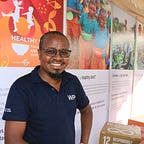How herders are turning to farming and fishing to earn a living in Kenya
Learning to adapt to climate change is the only solution
Early morning in Katilu village, about 120 kilometres south of Lodwar, Veronica Chegem works on her farm, her jembe rhythmically slicing through the air, only pausing to catch her breath occasionally.
It has been raining heavily — after more than a year of drought. The brown haze sitting in the air has been washed away and, in its place, are expansive blue skies.
Veronica is digging holes ready to put seeds in the ground. She is planting maize and green grams this season.
Forced to the farmland
Katilu irrigation scheme is one of more than 50 that dot the course of the Turkwell River. Many who practice agriculture here come from a lineage of herders, but are increasingly turning their efforts towards farming.
“My father used to keep animals,” says Veronica. “But the Turkana [fellow community members] came with guns and took them all.”
Conflict with neighbouring communities is still rife and is exacerbated by a cycle of increasingly severe and frequent droughts, placing ever more pressure on scarce grazing land for pastoralists. While many still herd livestock, others like Veronica are seeking alternative livelihoods.
“Katilu irrigation scheme covers about 600 hectares and is the primary source of food and income for over 2,500 families,” explains Phillip Ebong’on, a leader of a section of the scheme. “Every family farms a half-acre [0.2 ha] plot and all have access to water from the river through a network of canals.”
Advancing farming among pastoralists
The World Food Programme (WFP) is investing in strengthening food systems among communities in the arid areas, not just focusing on improving production, but also on food transformation, processing, marketing, and consumption — including guarding the safety and quality of food all the way to the dinner table.
This approach makes it possible for WFP and partners to offer an array of solutions to bottlenecks and risks experienced along various value chains that communities in arid areas depend on.
Farmers in Katilu have demonstrated amazing progress over a few short seasons. Previously recipients of food transfers, they now produce enough crops to sell, and in the past WFP has bought food in Katilu for the school meals programme.
“In Katilu, WFP is assisting the community to build and equip a milling and fortification factory,” explains Gabriel Ekaale, a Policy Programme Officer with WFP in Turkana. “Farmers will be able to process their produce close to their fields, adding value through fortification and giving it a longer shelve life so they can fetch higher returns from local markets and neighbouring towns.”
The Katilu factory will have the capacity to process nutritious mixed flours from maize, sorghum, cassava, and sweet potato.
Supporting diverse options
In Kalokol, a village along the western shores of Lake Turkana, about 60 kilometres northeast of the county capital Lodwar, WFP and the Turkana County Government is working with 200 fisherman from five Beach Management Unit’s (BMUs) to improve the scale and profitability of their fishing business. Many of these fisherman had previously been pastoralists but the changing climate has forced them to seek alternative livelihood opportunities.
WFP has provided 10 motorized boats to the communities which can haul up to 2 metric tons of fish each, as well as fishing gear including nets, life-jackets, anchors and oars. Training will also be given around fish breeding grounds conservation, post-harvest handling, safety and quality, storage and marketing. As well as the importance of adoption of sustainable cold chain storage solutions, net making by youth and women led groups and voluntary savings and loans schemes. This support is expected to directly benefit over 1,200 people.
The pilot project hopes to address the chronic food and nutrition security challenges that are evident among most of the fishing families along Lake Turkana while offering a source of income.
“There are many families that have left livestock keeping and now rely on the lake for food and income, yet they don’t have equipment or the knowledge needed to profitably engage in fishing activities. Meanwhile there is good demand for lake fish in Kenya and even internationally. With the right support, networks and skills, there is good money to be made.” says Gabriel.
Click here to learn more about WFP’s work in Kenya.
